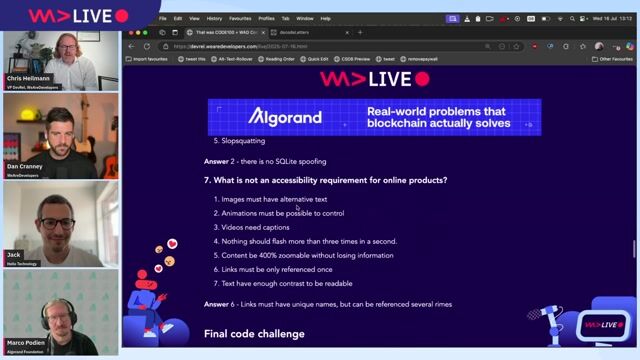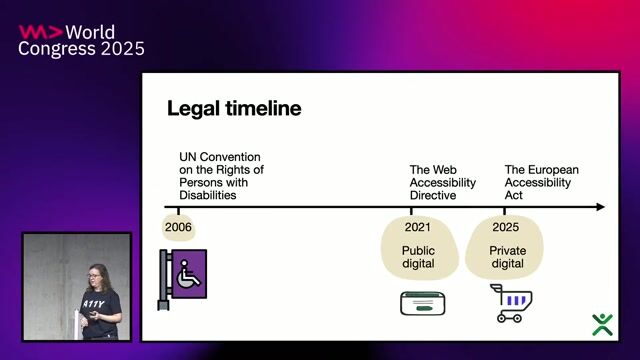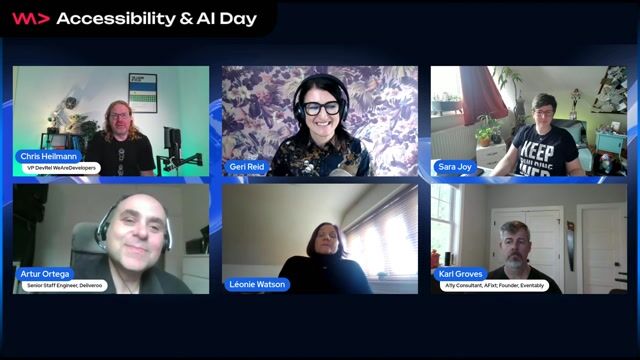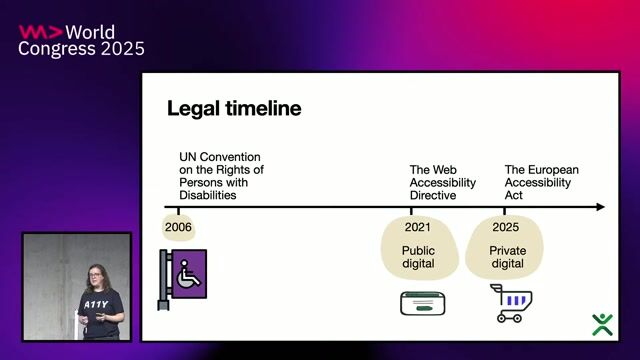Léonie Watson
Fireside Chat: Can Regulation Improve Accessibility? - Léonie Watson
#1about 4 minutes
Understanding the European Accessibility Act (EAA)
The European Accessibility Act covers specific sectors like e-commerce, banking, and streaming services, but its vague language creates challenges for organizations trying to comply.
#2about 3 minutes
Debating gatekeeping versus an open and innovative web
While strict "building code" style regulations for software could improve standards, they risk stifling the open innovation that has defined the web.
#3about 5 minutes
Integrating accessibility into core developer education
The root cause of inaccessible products is the failure to teach accessibility as a default practice in universities and bootcamps, treating it as an isolated module instead.
#4about 5 minutes
Examining legal enforcement and financial penalties
The lack of significant legal precedent and financial penalties, unlike GDPR for data privacy, has historically weakened the enforcement of accessibility standards.
#5about 6 minutes
Navigating a fragmenting web and AI content scraping
Differing national regulations and corporate paywalls are fragmenting the web, while AI scraping creates traffic issues that may require new content formats like Markdown.
#6about 3 minutes
Shifting accessibility left within product teams
Truly embedding accessibility requires organizational change with dedicated time and KPIs, but individuals can also drive progress through "guerrilla" tactics by integrating best practices without permission.
#7about 6 minutes
How AI and voice interfaces could impact accessibility
While AI-driven voice interfaces offer potential accessibility benefits, their practical application is limited by environmental factors like office noise and privacy concerns.
#8about 5 minutes
Prioritizing foundational training over reactive legislation
The most effective path to accessibility is not just relying on legislation, but fundamentally training designers and developers to build accessibly by default as part of their craft.
#9about 5 minutes
Exploring advances in synthetic speech and voice banking
AI has dramatically improved synthetic speech quality, enabling powerful applications like voice banking for individuals who may lose their ability to speak.
#10about 6 minutes
Fixing common issues at the source in frameworks
Many accessibility problems are simple to fix, and addressing them within popular frameworks and component libraries could have a massive positive ripple effect across the web.
#11about 3 minutes
The future of tech jobs and accessibility-driven innovation
While AI may change the job market, history shows that technological advances create new roles, and accessibility continues to be a key driver of mainstream innovation.
Related jobs
Jobs that call for the skills explored in this talk.
Eltemate
Amsterdam, Netherlands
Intermediate
Senior
TypeScript
Continuous Integration
+1
Wilken GmbH
Ulm, Germany
Senior
Amazon Web Services (AWS)
Kubernetes
+1
Matching moments

04:12 MIN
Connecting web accessibility requirements to ethical AI development
WeAreDevelopers LIVE - Our World Congress 2025 & CODE100 Highlights with Jack Barber and Marco Podien

07:58 MIN
What the European Accessibility Act means for developers
WeAreDevelopers LIVE - Accessibility isn't magic, Longevity, Devrel in times of AI and more

05:27 MIN
Understanding the EU Accessibility Act for developers
Developers vs Scammers, Bad Design, AI is Pointless, AJAX is 20 and more - The Best of LIVE 2025 - Part 1

02:45 MIN
Assessing the current state of web accessibility with AI
AI and Accessibility: The Good and the Bad - Fireside Chat

07:07 MIN
Understanding the upcoming European Accessibility Act
WeAreDeveloper Live: Accessibility in the EU, CSS Gaps and forms with Emma Dawson

07:07 MIN
Preparing for the upcoming European Accessibility Act
WeAreDevelopers LIVE - Gaps in CSS, EU Accessibility Act and more!

02:28 MIN
Understanding the European Accessibility Act
Unsolved mysteries between Usability and Accessibility in iOS

02:58 MIN
A brief overview of European accessibility legislation
Oh S***! There's a New Accessibility Law and I'm Not Ready!
Featured Partners
Related Videos
 51:09
51:09AI and Accessibility: The Good and the Bad - Fireside Chat
Léonie Watson, Artur Ortega, Karl Groves & Geri Reid & Sara Joy
 24:30
24:30Oh S***! There's a New Accessibility Law and I'm Not Ready!
Emma Dawson
 37:41
37:41Shift Left On Accessibility - Geri Reid
Geri Reid
 1:10:08
1:10:08WeAreDeveloper Live: Accessibility in the EU, CSS Gaps and forms with Emma Dawson
Emma Dawson
 29:28
29:28AI is the Future of Accessibility - Karl Groves
Karl Gvoves
 1:42:35
1:42:35WeAreDevelopers LIVE - Accessibility isn't magic, Longevity, Devrel in times of AI and more
Chris Heilmann, Daniel Cranney & GrahamTheDev
 1:09:45
1:09:45WeAreDevelopers LIVE – Inclusion, Accessibility & Automation
Chris Heilmann, Daniel Cranney & Daniela Kubesch
 1:06:13
1:06:13WeAreDevelopers LIVE - Can AI save Accessibility?; Horrid HTML; The Frontend Treadmill and more
Chris Heilmann & Daniel Cranney & Dirk Ginader
Related Articles
View all articles



From learning to earning
Jobs that call for the skills explored in this talk.

EnableAll Limited
Charing Cross, United Kingdom
£60-100K
Senior

Synthesia
Charing Cross, United Kingdom
Remote
£120K
Senior
React
Figma
Cypress





adesso SE
Karlsruhe, Germany
Remote
API
Python
JavaScript
TypeScript

twentyAI Ltd
Leicester, United Kingdom
API
Python
Terraform
Amazon Web Services (AWS)

OneVision Software AG
Regensburg, Germany
API
C++
Java
Machine Learning
Continuous Integration